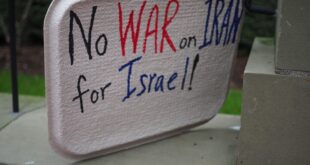 TEHRAN (FNA)- Sebastian Straten, a entrepreneurial Dutchman, is preparing for the day when tourists flock to Iran.
TEHRAN (FNA)- Sebastian Straten, a entrepreneurial Dutchman, is preparing for the day when tourists flock to Iran.
His guest house business – a joint venture with an Iranian partner which was dreamed up during a backpacking holiday three years ago – may be an unlikely embryo for a fortune.
But it serves to highlight the potential opportunities companies in the West are passing up to Asian rivals happy to do business with a country that outgoing US President George W. Bush allegedly dreamt to attack.
Straten is developing a small-scale hotels venture in the central city of Yazd, renowned for its labyrinth of lanes between old mud brick buildings and ‘wind catcher’ towers designed to cool houses in the desert heat.
He aims to expand to the cities of Isfahan, Shiraz and Qazvin, opening more hotels on the Silk Road, an ancient trade route that linked China with the Middle East and Europe.
Famous tourist sights in Iran include 2,500-year-old ruins at Persepolis near Shiraz and 16th-century Islamic architectural gems in Isfahan. Visitors to the Middle Eastern country can also enjoy skiing, diving and nature.
Straten himself first came to the Islamic Republic as a tourist in 2005, and he is confident his business will eventually pay off.
“Maybe I’m crazy,” said Straten, who quit as product manager at a privately owned pharmaceutical firm to go backpacking, and is now obsessed by the potential of the two small hotels he and his Iranian partner Ali Montazer Ghaem currently own, Reuters.
“I wouldn’t do this if I did not have a very different thinking from other people,” the 35-year-old said. “Everything I have, everything I am, everything I believe in, is in this country. It is 100 percent commitment.”
Iran, which sits on the world’s second largest reserves of both oil and gas, is facing US sanctions over its civilian nuclear program.
Iranian officials have dismissed US sanctions as inefficient, saying that they are finding Asian partners instead. Several Chinese and other Asian firms are negotiating or signing up to oil and gas deals.
Following US pressures on companies to stop business with Tehran, many western companies decided to do a balancing act. They tried to maintain their presence in Iran, which is rich in oil and gas, but not getting into big deals that could endanger their interests in the US.
Yet, after oil giants in the West witnessed that their absence in big deals has provided Chinese, Indian and Russian companies with excellent opportunities to signing up to an increasing number of energy projects and earn billions of dollars, many western firms are slowly losing reluctance to invest or expand work in Iran.
Some European countries have also recently voiced interest in investment in Iran’s energy sector after a gas deal was signed between Iran and Switzerland regardless of US sanctions.
The National Iranian Gas Export Company and Switzerland’s Elektrizitaetsgesellschaft Laufenburg signed a 25-year deal in March for the delivery of 5.5 billion cubic meters of gas per year.
The biggest recent deal, worth €100m ($147m, £80m), was signed by Steiner Prematechnik Gastec, the German engineering company, this month to build equipment for three gas conversion plants in Iran. This is at a time when France’s Total, Royal/Dutch Shell and Norway’s Statoil have put on hold their shares in multi-billion dollar contracts.
Washington and its Western allies accuse Iran of trying to develop nuclear weapons under the cover of a civilian nuclear program, while they have never presented any corroborative document to substantiate their allegations. Iran denies the charges and insists that its nuclear program is for peaceful purposes only.
Tehran stresses that the country has always pursued a civilian path to provide power to the growing number of Iranian population, whose fossil fuel would eventually run dry.
Despite the rules enshrined in the Non-Proliferation Treaty (NPT) entitling every member state, including Iran, to the right of uranium enrichment, Tehran is now under four rounds of UN Security Council sanctions for turning down West’s illegitimate calls to give up its right of uranium enrichment.
Tehran has dismissed West’s demands as politically tainted and illogical, stressing that sanctions and pressures merely consolidate Iranians’ national resolve to continue the path.
The UN sanctions address individuals and companies involved in nuclear- and arms-related activities without banning daily trade and non-nuclear investment.
But the US has imposed unilateral restrictions in particular on financial transactions and big investments.
As some Europeans pull out, companies from Asia are readily stepping into the breach. Chinese oil refiner Sinopec signed a deal last December to invest $2 billion in Iran’s Yadavaran oil field and Malaysian firm SKS Development has a multi-billion-dollar gas development contract.
Whatever the political and bureaucratic obstacles, a market of 70 million and a wealth of natural resources make Iran difficult to ignore.
It is still the world’s fourth-largest oil exporter and boasts the second-biggest reserves of natural gas after Russia.
“It is almost impossibly difficult … and it is impossible to walk away,” said one senior official at a Western firm that has invested in Iran, speaking on condition of anonymity.
According to Straten, Iranians don’t take too kindly to investors who walk away but hope to return when the climate improves.
“Iranians are very proud people. Once you cut the relationship with an Iranian, he will not easily forget this,” he said. “We Europeans are losing … the battle for investment in Iran, if we are not careful.”
His guiding principle is simple: it is better to be among the first foreigners investing in Iran’s nascent tourism industry than a latecomer in nearby Dubai, the Persian Gulf’s commercial hub – especially during a financial crisis.
And unlike Western multinationals which occasionally have to sacrifice promising markets to the prevailing political agenda, Straten is able to focus closely on his goal.
Even so, it took him six months to obtain the necessary investment license allowing him to plow up to 500,000 euros ($661,000) into his business over five years. But he has praise for Iranian law that protects foreign investments and says the authorities were supportive of his plans.
The obstacles facing his hotels business had more to do with Western financial institutions cutting ties with Iran as a result of US pressure, forcing him to switch banks.
“I’m limited in my business by my own bank, which is not something you would expect,” Straten said. “It is more the outside difficulties I encounter than any difficulties in Iran.”
Investors in Iran need to find reliable local partners to operate successfully in the country, Straten said.
“Even if you have a lot of money and a lot of contacts … it is crazy to think that you can succeed in Iran without a good local partnership.”
Straten’s own chances of developing a successful hotels business are enhanced by the fact that Iran sees tourism as a priority and wants to invest more than $30 billion in the sector over the next two decades.
Such plans and cases like Straten prove that the West should adopt a longer-term change in attitudes toward Iran.
 Eurasia Press & News
Eurasia Press & News



